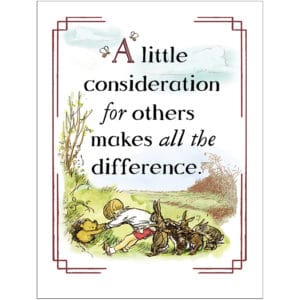Going back to when I was young, I still vividly remember my school years. It was not just all fun playing with friends or learning different sciences that could be useful for our future. We school children also learnt to behave, learnt about manners, respecting your elders and most importantly “being considerate”.

The ‘being considerate’ etiquette also exists in Western culture but when socialising with Thai people, you may feel like you do not understand when to be considerate, how not to offend Thai people or you may even feel offended yourself when Thais say or do something that doesn’t seem like they have any consideration at all.
Cultural differences play an important role here. There are so many differences in beliefs, customs and mannerisms that I cannot list them all in one page. Even among Thais ourselves, we are different in personal beliefs. Therefore, I will only explain the terms we use for being considerate and give some situational examples.
There are two types of consideration when socialising;
Consideration 1)
Being polite and caring. Thinking of other people’s feelings, considering how we would feel if it were the same to us and then treating people decently and with respect. In Thai we have a saying for this;
Ao Jai Kăo Maa Sài Jai Rao
to take + heart/mind/spirit + he/she/his/her/hers + to come + to put into/on + heart/mind/spirit + us/our/ours
= [phrase] be thoughtful of others, be considerate of other people’s feelings
Comparable English saying is ‘to put yourself in someone else’s shoes’
Among children, they commonly tease their friends on their inferiority. For example, calling their disabled classmate ไอ้เป๋ : Âi Pĕ_ : impolite title used with males + be distorted/twisted/inclined = You, cripple leg. So generally adults who are thoughtful would teach their children to not say it, to be thoughtful as if it was yourself, how would you feel to be called that and we should have compassion for your disabled friend.
On the other hand, you may also notice that sometimes Thais call each other by their looks or characteristics. For example, calling their friend อ้วน : Ûan : be fat = Chubby, Fatty which in Western culture you find to be very offensive, while in Thai culture, being called อ้วน : Ûan may not be offensive at all. This is because in Thai culture, for certain people, teasing their family members and close friends by their looks or characteristics is acceptable as a playful thing which in Thai is called หยอก(เล่น) : Yòrk~(Lê_n) : to tease + (to play) = to tease, to kid, to make fun of. However, there is a limit. If the person who was teased does not like it then it should be taken into consideration and we would not tease people who we are not close to as it would be considered bad manners.
Consideration 2)
Be polite and considerate to not cause inconvenience, trouble or offend others or make other people feel uncomfortable. There is a word we use for this;
Gre_ng~Jai
be afraid/be in awe of/dread + heart/mind/spirit
= [feeling verb] be considerate (to not cause inconvenience, trouble or offend others or make other people feel uncomfortable)
“ ความเกรงใจเป็นสมบัติของผู้ดี : Kwaam+Gre_ng~Jai Bpe’n Sŏ’m-búd Kŏrng Pûu+Dee” meaning “The attribute of a refined person is consideration”. This saying is rooted in Thai society. When we, Thais who have manners, do something, we would consider if our actions could trouble someone else. We would consider if we should act or not. That is why sometimes you may think we do not speak our mind.
We do not just think about being considerate but we also express it out as a manner. So I would like to give some common situations that Thais would be considerate to not cause inconvenience, trouble or offend others or make other people feel uncomfortable and may express the feeling ‘เกรงใจ : Gre_ng~Jai’.
Situation 1: Asking for help, aid or assistance
For example, on a rainy day, if I offer my Thai friend a lift but my Thai friend is reluctant to take the offer even though in her mind she thinks a lift in a car would be more convenient than taking a bus (which would be full of soaking wet people) but because she may think that it would be inconvenient for me in some way she may therefore reply something like;
Mâi Bpe’n (À)-rai Jâ
no/not + be, is/am/are (status) + matter/what + informal polite particle used by females
= Don’t worry. (It’s not a matter we should worry about)
She could also politely add;
Bee Gre_ng~Jai Jíab
..(name).. + be considerate + ..(name)..
= I feel that I am going to trouble you.
= I don’t want to trouble you.
Between Thais, in this situation, I instantly perceive that she is feeling considerate to not cause inconvenience to me and I would reply to her;
Mâi Dtôrng Gre_ng~Jai.
no/not + must/have to + be considerate
= You shouldn’t feel you are troubling me.
= Do not feel that you are troubling me.
I would most likely say something to make her feel more at ease to accept my offer;
Mun Bpe’n Taang Pàan Por~Dee
it + be, is/am/are (status) + way/route + to pass + be fit/be suitable/be just right
= It is actually on my way (home).
Then usually, after making someone feel at ease to take your kind offer, they would take the offer and say thank you. So my friend would say;
Jâ. Kôrb~Jai Mâak Jâ
OK/Yes. + thank you (to same age or younger person) + much + informal polite particle used by female
= Alright then, thank you very much.
Situation 2: Someone offers something, a gift or reward
For example, my sister gives a birthday present to her friend Bee, and when receiving the present,
Bee says;
Kôrb~Koon Mâak
Thank you + much
= Thank you very much.
Gre_ng~Jai Jung Leoi
be considerate + greatly, extremely + really, indeed
= (I) really extremely feel that I am troubling you.
= I am really troubling you.
Mâi Dtórng Sûee Hâi Gôr~Dâi
no/not + must/have to + to buy + for/pass on, to give + ..(something).. is fine.
= You do not need to buy (a present) for (me) in which case it is fine by me.
= It’s alright if you didn’t buy it for me.
= You shouldn’t have.
Then my sister replies;
Mâi Dtôrng Gre_ng~Jai Jâ
no/not + must/have to + be considerate + informal female polite particle used by females
= You shouldn’t feel that you are troubling me.
= Please do not feel that you are troubling me.
Kŏrng~(Kwŭn) Lé’k~Lé’k Nói~Nói
present/gift (thing~spirit/morale) + small~small (size) + little~little (amount)
= It’s just a little thing.
Situation 3: When being a guest
The host usually perceives the feeling of ‘เกรงใจ : Gre_ng~Jai’ from their guest. For example, at a birthday party, before starting to eat dinner, Bee, who is the host, says;
Chern Kâ
to invite + female polite particle used by females
= You are invited (to start eating).
= You are welcomed (to start eating).
= Please help yourself.
= Please (start).
Dtaam Sà-baay Ná Ká.
to follow/pursue + be comfortable, be relaxed + emphasis particle + female polite particle used by females
= Please be comfortable.
= Please feel free.
Mâi Dtôrng Gre_ng~Jai Kâ
no/not + must/have to + be considerate + emphasis particle + female polite particle used by females
= You shouldn’t feel that you are troubling me.
= Please do not feel that you are troubling me.
Situation 4: When doing something that may cause trouble to people
For example, Bee turned the music down when it was late and says to her friends;
Dùek Láew
late at night + already
= It’s already late.
Bpèrd Plaeng Sĕang Dung Mâi Dee
to turn on/to open + song + sound + loud + no/not + be good/nice
= Turning on loud music is not good.
= It is not good to turn on loud music.
Gre_ng~Jai Pûean~Bâan
be considerate + neighbour (friend/buddy/companion/fellow~house)
= (I) feel considerate to not trouble (my) neighbour.
= (I) don’t want to trouble (my) neighbour.
Situation 5: When you feel bad about a situation in which somehow you feel responsible for the inconvenience or trouble caused to others
For example, my sister took her children to a party and one of her children hurt himself and Bee, who is a doctor, offered to treat him. My sister then says;
Kŏr~Tô_d Ná Ká
to apologise (to beg/request~punishment/accuse) + emphasis particle + female polite particle used by female
= I apologise. / I am sorry.
เกรงใจจริง ๆ ที่คุณบีต้องลำบาก
Gre_ng~Jai Jing~Jing Têe Koon Bee Dtôrng Lum-bàak
be considerate + truly (true~true) + that + polite title + ..(name).. + must/have to + be inconvenienced, undergo trouble, have difficulty
= (I) truly feel considerate that you are troubling yourself.
= (I) feel that I am troubling you.
As you can see above, after experiencing British mannerisms, I find it is similar to when British people say things like ‘Don’t trouble yourself’, ‘You shouldn’t have to’, ‘Are you sure?’, ‘I feel bad’, ‘Don’t worry’ in a situation where they feel considerate or do not want to trouble others.
Situation 6: Because of the obligation in beliefs and culture, for example;
– Respecting elders. For example, normally, Bee is a party girl who would drink, have fun and party until early morning, but at the Birthday party where her parents and many other seniors also attend, she is being considerate and not drinking too much as her drunken behaviour may not be appropriate and could offend her parents.
– Respecting people who have a higher rank in society. For example, if a respected senior asks Bee to help him with a local event, even though Bee is very busy and it would be inconvenient for her she is reluctant to say No and accepts to help.
– Respecting local beliefs or customs. For example, Bee studied in the UK and adopted the attitude of wearing bikinis. However, when she is back in Thailand, in her seaside hometown, she does not wear a bikini as the locals find it impolite and unpleasant to show too much skin.
– Respecting people who have been good to you. For example, Bee is a doctor and is approached by another clinic for better position and wage. However Bee reluctantly rejects the offer as she feels her current boss has given her a good opportunity, taught her many things and has been very nice to her.
– Respecting other people feelings. For example, Bee and her ex-boyfriend are still very good friends but Bee is being considerate not to invite him to her birthday party as it would make her new boyfriend feel uncomfortable.
Conclusion
Being ‘ เกรงใจ : Gre_ng Jai’ is subjective to situations and personal beliefs. There can be a positive and negative side of being ‘เกรงใจ : Gre_ng Jai’. The positive side helps us to live in harmony with each other but the negative side stops us from speaking our mind, in other words, not being true to ourself. Usually, when we speak our mind, Thais may think we do not have manners. In whatever way, I personally believe there is a balance in being considerate and being true to ourself.

Post By ครูเจี๊ยบ : Kruu Jíab
Follow Kruu Jiab for free Thai language updates here



